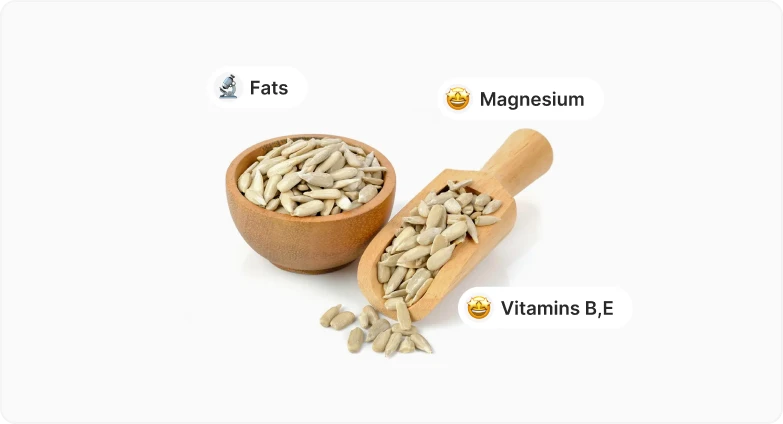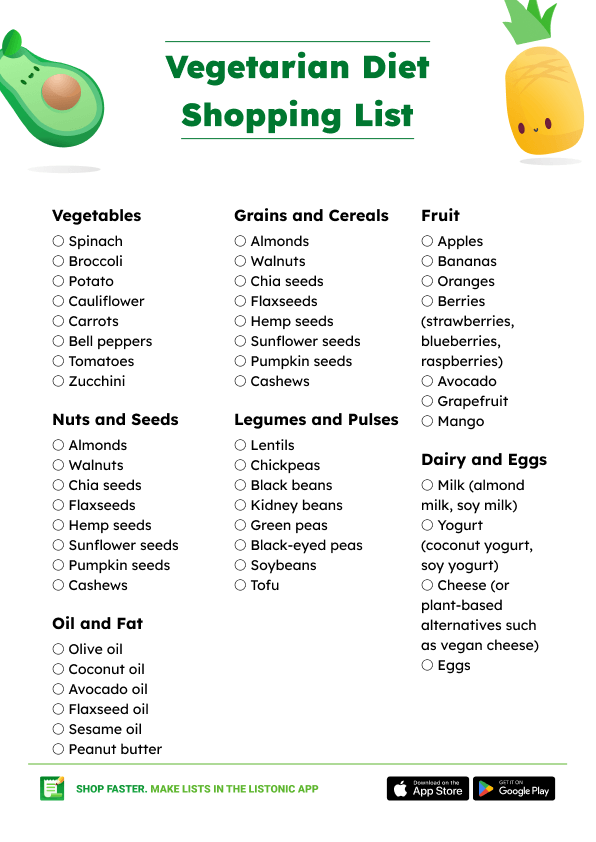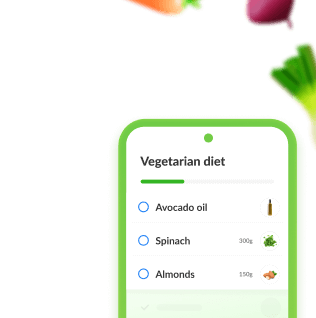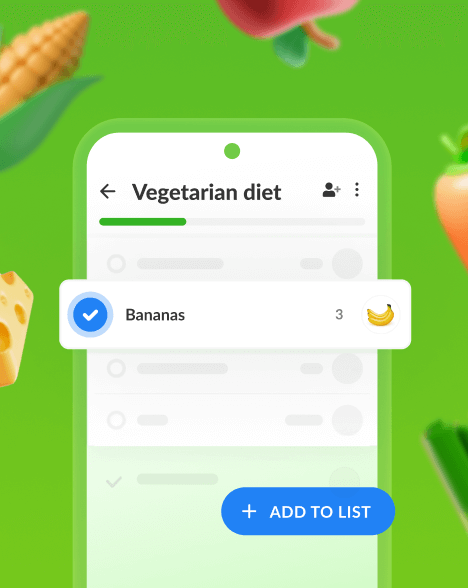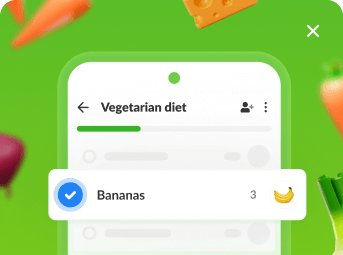Privacy Policy | Terms of services | Consent choices | © 2006-2024 Listonic. All rights reserved. Listonic Dev, and Listonic Ads are part of Listonic.
Vegetarian Diet Food List (+ Shopping List and PDF)
June 28, 2023
The vegetarian diet emphasizes plant based foods and includes dairy products along with eggs. By incorporating a variety of ingredients, you can meet your nutritional needs, lower the risk of chronic diseases, and improve heart health. Plus, you’ll have a positive impact on the environment. This article explores the core principles of the vegetarian diet and offers tips for adopting a vegetarian lifestyle. It also provides a convenient shopping list to make the transition even easier.
Table of contents
Vegetarian Diet Shopping List
Vegetarian Diet in a Nutshell
Vegetarian Food List Breakdown
What Else to Keep in Mind?
Conclusions
Vegetarian Diet Shopping List
Vegetables
Legumes and Pulses
Nuts and Seeds
Grains and Cereals
Fruit
Dairy and Eggs
Oil and Fat
Vegetarian Diet in a Nutshell
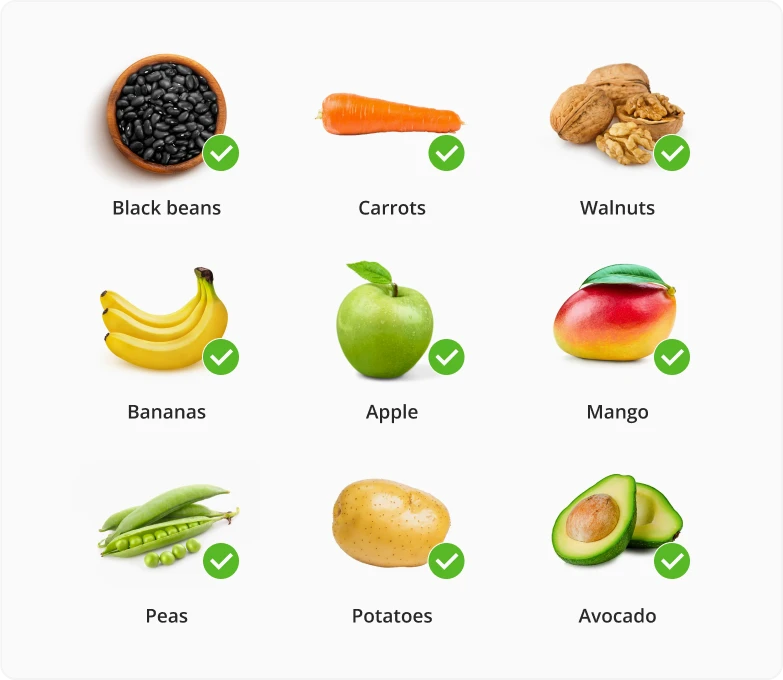
The vegetarian diet includes fruit, vegetables, legumes, whole grains, nuts, while also allowing you to eat dairy and eggs. The diet is full of vital nutrients with a reduced amount of saturated fat and has been linked with health benefits such as lowering people’s risk for heart disease or particular cancers.
But this diet is not only about what you put in your stomach. It promotes sustainability, animal welfare, culinary exploration, and personal well-being. It’s actually a compassionate choice that reduces ecological impact, encourages creativity in the kitchen, and supports a nutritious and healthy lifestyle.
One thing you should keep in mind is that a vegetarian lifestyle may make it difficult to ensure appropriate levels of certain micronutrients need consideration like iron or vitamin B-12 which typically are only found in animal-sourced food items.
Vegetarian Food List Breakdown
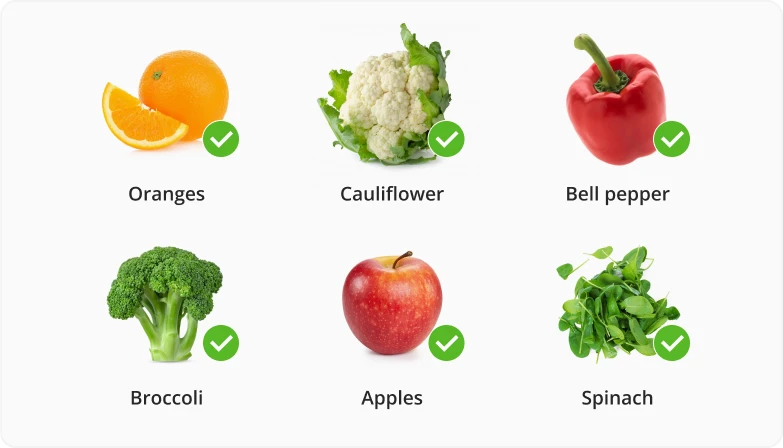
Vegetables
Vegetables are the foundation of a vegetarian diet, providing an array of vital nutrients such as vitamins, minerals, antioxidants, and dietary fiber.
Spinach, broccoli, potato, cauliflower, carrots, bell peppers, tomatoes, and zucchini bring a kaleidoscope of colors, textures, and tastes that can be savored in their raw state or prepared through sautéing, roasting or being incorporated into diverse vegetarian recipes. These vegetables deliver crucial nourishment for maintaining good health, while also aiding digestion and helping to stave off chronic illnesses.
Fruit
Fruit are not only a delicious addition to this diet but also a vital source of essential minerals. Apples, bananas, oranges, berries (such as strawberries, blueberries, and raspberries), avocado, grapefruit, and mango can be enjoyed as snacks, added to smoothies, used in salads, or enjoyed as refreshing desserts.
They provide natural sweetness, hydrating properties, and valuable nutrients that promote immune health, support digestion, and offer protection against oxidative stress.
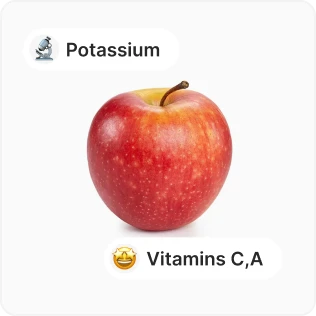
Grains and Cereals
They play a crucial role in a vegetarian diet as they offer essential carbohydrates that supply long-lasting energy for everyday tasks. They are incredibly adaptable ingredients that can be incorporated as delightful side dishes, delectable main courses, or even used for baking.
A wide array of options such as brown rice, quinoa, oats, barley, whole wheat bread, cornmeal, and millet presents diverse textures, delightful flavors, and significant nutritional benefits. These choices ensure diversity and fulfillment in vegetarian meals.
Legumes and Pulses
They offer an outstanding source of protein derived from plants. These remarkable sources supply essential amino acids essential for promoting muscle growth, recovery, and maintaining one’s overall well-being. Lentils, chickpeas, black beans, kidney beans, green peas, black-eyed peas, soybeans, and tofu can be adeptly fashioned into wholesome stews, and delicious salads.
Plus, they effortlessly bridge the gap as an exceptional substitute to meat produced entirely using plant-based ingredients.
Nuts and Seeds
They contribute essential plant-based protein, promote healthy fat intake, offer fiber, and deliver a vast array of essential vitamins and minerals. Almonds, walnuts, chia seeds, flaxseeds, hemp seeds, sunflower seeds, pumpkin seeds, and cashews – these are all delightful options that can be relished as snacks or used as delectable toppings for salads and desserts.
Furthermore, these versatile ingredients can be seamlessly integrated into vegetarian recipes to provide not only a nice texture along with a source of nourishment.
Dairy and Eggs
As opposed to vegan diet, a vegetarian diet often include dairy products or plant-based alternatives, as well as eggs, to incorporate additional protein, calcium, and other essential nutrients.
A variety of options are available: milk or plant-based alternatives like almond milk or soy milk; yogurt or plant-based alternatives like coconut yogurt or soy yogurt; cheese or plant-based alternatives like vegan cheese.
These ingredients can be used in a range of vegetarian recipes to add texture and richness. They also help to meet nutrient needs, particularly for bone health with their calcium content and for vitamin B12.
Oil and Fat
There is a wide array of vegetarian options available, such as olive oil, coconut oil, avocado oil, flaxseed oil, sesame oil, and peanut butter made solely from peanuts. Each of these oils possesses its own unique flavors and attributes when it comes to cooking.
Moreover, they are rich in healthy monounsaturated and polyunsaturated fats that help promote heart health, improve brain function, and aid in the absorption of fat-soluble vitamins.
You can incorporate these oils and fats into your vegetarian diet by using them for sautéing, baking, dressing salads with a delightful aroma or even spreading them on bread to add an extra layer of flavor. By doing so, you’ll not only enhance the taste but also contribute to a satisfying vegetarian lifestyle.
Get a Vegetarian Grocery List on Your Phone!
Add & remove items
Sort items by store aisles
Share the list with your partner
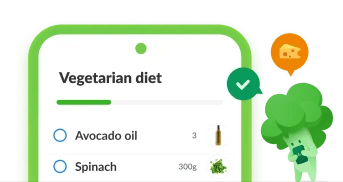
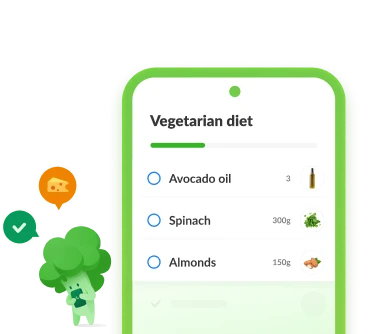
What Else to Keep in Mind?
What Foods to Avoid?
Simply put, avoid consuming meat and perhaps limit your dependence on eggs and dairy. You should make it a habit to carefully read food labels and be mindful of potential ingredients derived from animals that may be present in packaged or processed foods. Here are examples of foods that are typically avoided in a vegetarian diet:
Meat: which includes beef, pork, lamb, poultry, game meat, and seafood. Fish, shellfish, and other types of seafood.
Gelatin: which is derived from animal bones and tissues and is commonly used as a gelling agent in desserts, marshmallows, and certain kinds of candy.
Animal fats: like lard and tallow.
Traditional meat-based broths and stocks: chicken or beef broth. However, vegetarians can use vegetable broth or stock as an alternative.
Some cheeses may contain rennet, which comes from the stomach lining of animals. Vegetarians have the option to avoid cheeses made with animal-derived rennet or choose vegetarian-friendly alternatives.
Certain food additives like specific food colorings, gelatin-based thickeners, and enzymes derived from animals may be present in processed foods. Vegetarians should check for these additives to ensure their suitability for their dietary needs.
How to add more protein to a vegetarian diet?
In a well-rounded vegetarian diet, there is a wide range of options and strategies available to include protein rich foods into meals and snacks.
Legumes such as lentils, chickpeas, black beans, and kidney beans are exceptional sources of protein that should be regularly incorporated into meals. They can be used in soups, stews, salads, or as the main ingredient in dishes like vegetarian chili or bean burgers.
Another versatile protein-rich option is tofu and tempeh, which are soy-based products. These can be marinated and stir-fried, grilled, baked, or used as a substitute for meat in various recipes.
Quinoa is a complete protein source that can serve as a base for salads, bowls, or side dishes. Additionally, whole grains like brown rice, barley, and amaranth also contribute to protein intake and can be easily integrated into meals.
Eggs: are a versatile source of complete protein that can be enjoyed in numerous ways. Whether you prefer scrambled eggs, omelets, or incorporating them into your baking and cooking endeavors, eggs provide a satisfying and nutritious option.
How to add more iodine to a vegetarian diet?
Adding more iodine to a vegetarian diet is vital as iodine is key for thyroid function and overall health. By incorporating the iodine-rich foods listed below, you can support your iodine requirements while following a vegetarian diet:
Opt for iodine-rich dairy options such as milk and yogurt. Certain dairy products have been fortified with iodine in order to increase their nutritional content.
Look for iodine-fortified vegetarian foods such as bread, breakfast cereals, and plant-based milk alternatives. These products have been enriched with iodine to provide an additional source of this essential nutrient in your diet.
Incorporate sea vegetables such as nori, kombu, and wakame into your diet. These seaweeds are rich in iodine and can be used in salads, soups, or as a wrap for sushi rolls.
Conclusions
Integrating a vegetarian diet into your lifestyle can have significant benefits for both your health and overall well-being. With its emphasis on plant-based foods, this type of diet provides nourishment while taking sustainability into account.
To assist you in transitioning to a vegetarian lifestyle successfully, we have compiled an extensive vegetarian shopping list featuring an array of ingredients. Feel free to download our list or use it in our free mobile app to make shopping even easier.
